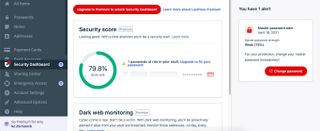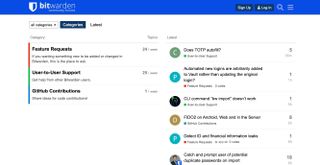Bitwarden vs LastPass
In comparing Bitwarden vs LastPass, we analysed these two leading password managers on support, security, pricing, and more to see which is right for you

It's more important than ever to use unique passwords for each separate online account, but without managers it can be virtually impossible to remember hundreds of different logins. By locking all logins behind one master password, you'll only need to remember one login to keep your accounts safe and secure.
The best password managers store all login credentials for multiple sites and platforms in one secure location, locked behind a master password. In comparing two leading managers—Bitwarden vs LastPass—we aim to help you decide which is right for you.
Both platforms offer solutions for individuals, families, and teams, top-tier security features, and integration with a wide range of devices.
- Bitwarden: secure, open-source management
As an open-source password manager, Bitwarden is free for personal users, and offers a Premium account and business plans for more tools. Its tools and features include a secure password generator, 2FA, vault health reports, and encrypted file attachments. - LastPass: a versatile manager with great options
Cross-compatible with Windows, macOS, Linux, Android, iOS, and Chrome OS, LastPass' versatile password manager provides free and paid options. Its solid interface and range of 2FA options add to a free version supporting unlimited passwords with a built-in password generator for stronger logins.
Bitwarden vs LastPass: Features
Bitwarden and LastPass both provide basic features you would expect from a password manager: password storage, a password generator, a way to securely share login information with other users, and even 1GB of file storage with the paid levels.
Crucially, both services enable users to save unlimited passwords on their account and sync them across all devices, even with their respective free plans. You can also store more than just passwords—both platforms support encrypted notes, credit card and bank account information, and more.
Both services also appear on our list for the best free password managers on the market, but they're certainly not equal. LastPass’s free service is lacking in a few key areas when compared to Bitwarden. While Bitwarden users can sync their passwords across multiple devices, LastPass users at the free level are restricted to one device, meaning you won’t be able to access your account on both the mobile app and your desktop. LastPass users can, however, switch their permitted device up to three times.
While neither service stores users’ master passwords to protect their privacy, Bitwarden users have the additional security option to self-host their passwords on their own server. For the security obsessed, this is an excellent feature. It's an open-source product, which gives it an additional security edge. Its source code is available in its entirety online, meaning it can be easily audited by third-party security experts. LastPass doesn’t face the same external scrutiny, although the company has an incredibly secure encryption system and has never reported losing user data.
These two password managers also offer a number of features for businesses. LastPass enables administrators to configure single sign-on for more than 1,200 popular business apps. All single sign-ons are trackable for added security. LastPass also gives your IT department control over more than 100 customisable security policies to implement user access management to different vaults.
Bitwarden stands out for enabling businesses to self-host their own passwords on their server. This comes with added responsibility, but it can be a major advantage if you don’t want to trust your company’s security to a third party. Plus, administrators get access to vault health reports that highlight weak passwords and audit logs to keep track of who is accessing what passwords.
We should be clear that LastPass’s security should more than suffice for the average user, but Bitwarden’s heightened measures and its ability to sync on more than one device make it the winner when it comes to features.
Bitwarden vs LastPass: Performance

With both Bitwarden and LastPass, it’s easy to set up an account and get started storing your passwords within seconds. Both Bitwarden and LastPass users can access the service via a web browser or mobile apps for iOS or Android, and both are available as desktop apps for Windows, Mac, and Linux. Bitwarden also has a desktop application, but we found the web app was simpler to use; although LastPass has slightly more features to make accessing your accounts more efficient.
They each offer browser integrations for Chrome, Firefox, Opera, Safari, and Edge (Bitwarden also has an extension for Tor). Helpfully, the browser extensions can be used to auto-fill credentials whenever you log into a website.
With LastPass, we found the mobile app slightly more straightforward than the web version, with tools like the password generator housed in a more intuitive location. With Bitwarden, we found little to distinguish the web and mobile versions. Both are light on extraneous features, making them extremely easy to navigate.
What we like about LastPass though is that the web and desktop interfaces are virtually identical. Everything you can do with the browser extension – including generating passwords and creating an unlimited number of new data categories—you can do with the desktop apps. That’s not true for Bitwarden, as the desktop apps don’t include password sharing features or the random password generator. One critical thing to note is that the Bitwarden desktop app doesn’t support two-factor authentication.
Where LastPass trumps Bitwarden in terms of ease of use is its password sharing feature. LastPass allows its users to share any password between each other, and it will appear in their vault just like a regular password. When sharing passwords, you can set privacy controls to determine whether the recipient can see it or not, enabling you to grant someone access to an account without them ever knowing your credentials.
Bitwarden is geared more towards businesses than individuals in this sense. You can share passwords with members of your organisation, but it’s worth noting that free users are limited to two-person companies only. Plus, the requirement to set up your organisation before you can share login information makes it a bit clunky.
Bitwarden does offer a way to send a secure text with login details, but this feature isn’t the most intuitive, and also requires you to share the actual password, which users may not be comfortable with. One critical thing to note is that the Bitwarden desktop app doesn’t support two-factor authentication.
That said, Bitwarden does have a trick up its sleeve: a command line tool. This works across operating systems, and allows you to integrate your password manager into complex scripts. You can also use it to generate new random passwords for all your accounts in the event of a data breach.
Overall, the two are comparable when it comes to use and performance, except for password sharing, where LastPass is the winner.
Bitwarden vs LastPass: Support

Neither LastPass nor Bitwarden stand out for their customer support. That’s not entirely surprising for Bitwarden since it’s an open-source project. Because it's open-source software, it has a particularly active community forum where users can ask questions of each other and request features from the development team. You can also contact Bitwarden by email, or search their FAQs database.
LastPass similarly offers a searchable FAQ database, a community forum, and support by email, although email support for free users ended in May 2021. Only business customers can access LastPass phone support. But we’d expect more from LastPass considering that it’s a widely used commercial software. Both platforms provide support by email only, and you have to jump through quite a few hoops to reach the contact form on LastPass’s website.
The good news is that both user forums are very active. You can post a very specific question and get an answer back within just a day or two. For basic setup and customisation questions, you’ll find a user guide on LastPass’s website and a set of basic tutorials on Bitwarden’s website.
Overall, the level of support between the two is comparable, although Bitwarden’s open-source nature means it’s easier to request features and to give feedback to the developers.
Bitwarden vs LastPass: Pricing and plans
Compared to any other password manager, we’d say that LastPass is cheap. But Bitwarden, as an open-source project, charges incredibly low subscription rates that few commercial competitors can match.
Both managers rank among the best free password managers, and with LastPass’s free plan, one user can store unlimited passwords on a single device. It has few restrictions for free users—the main feature missing is one-to-many sharing, which you might need for working in a team. If you want access to LastPass on unlimited devices, you will need to upgrade to its £2.60 a month Premium plan. LastPass’s £3.40 a month Families plan ups the number of users to six.
For businesses, LastPass has three plans depending on how many users you have, whether you need user access management, and whether you want single sign-on for popular apps. For £3.40 per user a month, there's an MFA plan with no password management features; for £5.10 per user a month, a Teams plan for businesses of 50 or fewer; and an Enterprise plan for businesses of more than 50.
Bitwarden’s free plan similarly limits sharing, but little else, and enables unlimited password storage on unlimited devices. Individual plans are significantly cheaper than LastPass’s, starting with the Premium plan at just £8.13 for the entire year, including a few extras like reports on your password strength and 1GB of free storage. For £32.51 a year, the Families plan will provide storage for up to six users.
Bitwarden has a free plan for businesses, but it only covers two users. The rest of the business pricing is comparable with LastPass. For £2.44 per user a month, businesses can have unlimited user accounts via the Teams plan, and for £4.06 per user a month, you can access some additional security features and the option to self-host via the Enterprise plan.
Bitwarden vs LastPass: Verdict
Overall, both Bitwarden and LastPass are strong choices for password managers with a lot in common. For most individual users, we think Bitwarden might be the better option, and it's significantly cheaper for families and businesses.
For individual users looking for a free service, Bitwarden’s ability to sync to multiple devices is a big feature that is missing from LastPass. For individuals looking for a paid service, to integrate a password manager into complex command line scripts, or host their own password database, Bitwarden offers a comparable product to LastPass at a significantly better price. And while both services are secure, Bitwarden offers a few security extras that edge out a victory in that regard.
However, if your primary reason for seeking out a password manager is to securely share passwords, LastPass makes it easier for both sender and recipient. While we feel Bitwarden is the overall winner, both services are worth checking out. LastPass may be a better option if you prioritise ease of use or if your business wants to enable single sign-on for increased productivity. And since both offer a free option, you can easily give them a try and see which one you prefer.
Further reading on password managers
Find out more about LastPass in our interview, and discover if it or Bitwarden rank among the best password managers for business in our buying guide. Should the worst happen and you need to recover a lost password, ensure you're using one of the best password recovery tools to do so. If you've got a new password but don't know if it's strong enough, try out some free platforms to test password strength.
Get the ITPro. daily newsletter
Receive our latest news, industry updates, featured resources and more. Sign up today to receive our FREE report on AI cyber crime & security - newly updated for 2024.
Sarah James is a freelance writer in Los Angeles. She has written about creativity, culture, and technology for brands like TechRadar, Submittable Content For Creatives, The Billfold, Pittsburgh City Paper, The Toast, and more.





